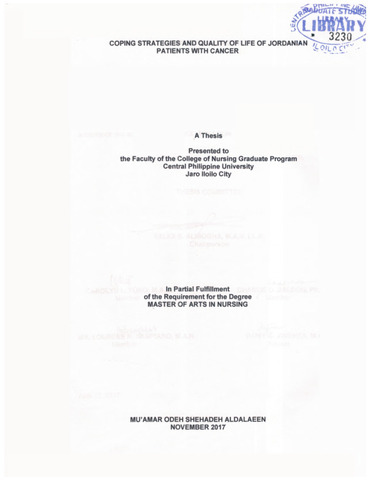Coping strategies and quality of life of Jordanian patients with cancer
摘要
This study was conducted to determine the coping strategies and quality of life of patients with cancer in Jordan. Specifically, it aimed to describe the respondents selected characteristics in terms of age, sex, marital status, educational attainment, tumor stage at diagnosis and length of time diagnosed; the respondents’ coping strategies and quality of life; whether or not there was a relationship between respondents selected characteristics and their coping strategies; whether or not there was a relationship between respondents selected characteristics and quality of life; whether or not there was variations in the quality of life when the respondents were group according to selected characteristics; and whether or not there was a relationship between respondents coping strategies and quality of life.
A descriptive relational study was utilized involved eighty (80) purposively chosen cancer patients undergoing chemotherapy in Jordan. A standardized instrument on coping strategy and quality of life adopted from the instrument used by world health organization (WHO) and Craver (1997). Data were processed using the SPSS Version 17 and results were analyzed and interpreted using the mean, median, frequency counts, percentage, Cramer’s V value, and Gamma value. Results of the study point to a higher proportion of female cancer patients, married, high school graduates, diagnosed with the disease for 6 months prior to the conduct of the study, and suffering either stage 1,2, or 3 of the disease. The majority of the cancer patients used support coping strategy while they most unpopular was evasive coping strategy. Coping strategies was found moderately associated with sex, age, and marital status, but weakly associated with educational attainment and tumor stage. Support coping strategy was found popular among males and females, married, college, and those there diagnosed with stage 4 and whose disease was diagnosed for 6 years and above. Slight variations in the mean score on the overall quality of life and on its special domain such as physical, psychological, and social relationships, were observed when the respondents were grouped according to sex, marital status, and educational attainment. A weak correlation was found between physical health and age and tumor stage. No correlation was found between length of time of diagnosed and physical health.
Psychological and social relationship were found to have negative and weak association with age, which means that younger patients tend to have better psychological and social relationship than older patients. Patients whose illness was diagnosed for 6 years and above had poor psychological and environment quality of life. Good physical, psychological, social relationship, and environmental quality of life were directly linked to positive coping strategy, as well as to support and active coping technique.
Overall, good quality of life is primarily promoted with the use of positive, support, and active coping strategies. Overall, the cancer patients receiving chemotherapy, had good quality of life. Looking into a more specific characteristic of the respondents, the younger patients with short length of time of diagnosis should to have better quality of life than the older patients and were disease had been diagnosed for more than six years.
描述
Abstract only
建议引文
Aldalaeen, M. O. S. (2017). Coping strategies and quality of life of Jordanian patients with cancer (Unpublished master thesis). Central Philippine University, Jaro, Iloilo City.
文件类型
Thesis主题
关键字
部
School of Graduate Studies学位
Master of Arts in Nursing货架位置
GSL Theses 610.73072 Al21
物理描述
ix, 106 leaves



